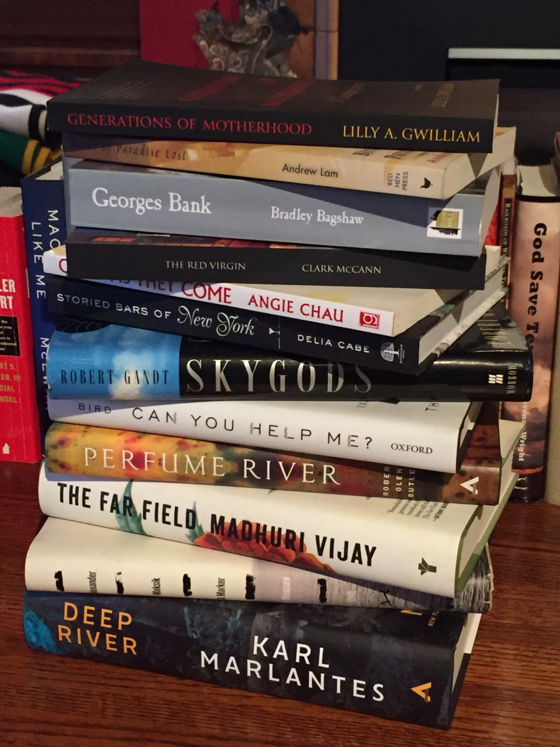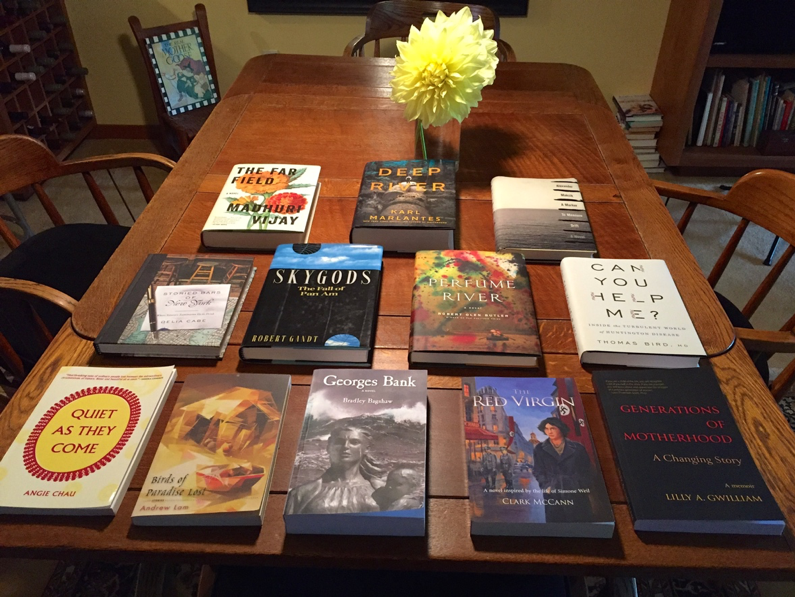
Our living room is lined with bookcases. Reading the spines will take you on a journey into our psyches. There are fairy tales, history books, classics, references, art books, biographies, adventure travel, modern fiction, Eastern and Western philosophy – books we had as children, college texts, anthologies, and many we haven’t read…yet. They comfort us, old and new friends, reminding us of our history, our aspirations, and what we love.
I’m especially inspired by the books my friends have written. The stack in the picture shows some of them but doesn’t begin to include all their titles. Some of the writers are older and some relatively young. Two or three are “retired” but writing full time, and the rest all have day jobs that may or may not involve writing. There’s a neurologist/geneticist, an executive recruiter, three lawyers, two university professors, two journalists, a retired energy consultant, a retired Boeing speechwriter, a former Pan Am Captain and two graduates of the Iowa Writers’ Workshop.
Some have achieved great success as writers – a Pulitzer Prize, several New York Times bestsellers, the Boyd Award for Excellence in Military Fiction, the Samuel Eliot Morrison Award for Naval Literature, and corollary successes as screenwriters, movie, TV, and print commentators. Three are self-published novels. Another is the definitive text on a rare but deadly disease, and two are fictional depictions of life as second generation immigrants.
What these friends have in common is a passion for writing. Alexander Maksik, represented by A Marker to Measure Drift, tells the story of how for years he wanted to be a writer but realized at some point that he couldn’t be a writer until writing became more important than wanting to be a writer. Since his first novel, You Deserve Nothing was published in 2011, he has published two more. He’s definitely a writer now.
Two of the other writers in the stack are special role models – Robert Olen Butler and Karl Marlantes. Both are Vietnam vets, but their experiences in-country were very different. Butler’s time was spent mostly in Saigon as an Army intelligence operative and translator, while Marlantes was a Marine platoon commander in the muddy jungles of the central highlands. Very different but formative experiences that led to prize winning fiction for both.
Butler returned to the US in 1971 and worked as a writer/editor for a trade journal publisher, but wrote fiction on the Long Island Railroad on his way to and from work. He published his first novel in 1981 and was awarded the Pulitzer Prize for Fiction in 1993 for A Good Scent from a Strange Mountain. So far, he’s written 17 novels, 6 short story collections, and From Where You Dream, a definitive guide to writing fiction.
Marlantes’ story is more complicated. He went to war after graduating from Yale and spending a Rhodes Scholar year at Oxford. Feeling guilty that his friends were going to Vietnam, he quit Oxford to become a Marine second lieutenant and was immediately sent to Vietnam as a platoon commander. He survived the war but earned two Purple Hearts, a Navy Cross, and 10 Air Medals over the course of 13 months in-country. After he was discharged, he returned to Oxford to complete his Rhodes studies then worked as an energy consultant in several overseas locations. It took years for him to deal with the PTSD he suffered (chronicled in What It’s Like to Go to War). He began writing about his Vietnam War experience in 1967, and started showing the work to publishers in 1980. It wasn’t until 2010 that Grove Atlantic took a chance on him. The novel, Matterhorn, was named one of the Notable Books of 2010 by the New York Times and stayed on the Times bestseller list for months. Since then he’s become a public figure, most recently helping to narrate Ken Burns’ PBS series The Vietnam War.
Another friend, Delia Cabe, is an established science writer who teaches magazine writing at Emerson College in Boston. Looking for new subject matter, she stretched out in 2017 and delivered a book “for well-read drinkers and boozy bookworms.” The Storied Bars of New York: Where Literary Luminaries Go to Drink tells tales of famous literary figures and the New York bars they frequented. Each of the bars has a literary anecdote and a cocktail recipe. My favorite is the Negroni recipe from The Writing Room , which not by chance is paired with Elaine’s. The Writing Room sits on the site where Elaine Kaufman (Elaine’s) once held court and catered to the literati. Elaine’s closed when Elaine died, but the new owners were not going to let the literary goodwill fade away. When I was single and lived on East End Ave, I sometimes went there to see who was hanging out. Back in the day it included William Styron, Peter Matthiesssn, Joseph Heller, Norman Mailer, George Plimpton, Woody Allen and others. It was the place for writers and Elaine ruled it like a prison warden. She once chased paparazzi photographer Ron Galella out the door screaming “Beat it creep. You’re bothering my customers.”
Elaine’s is gone, but Delia’s book is a tasty read and one you’ll love to hold. Books have a feel, sometimes even a subtle fragrance, that can help draw the reader in. Bookmaking is an art – the cover, the paper, the size, the art, all contribute to the pleasure. Delia’s is especially sensual. M and I have given The Storied Bars of New York to a number of friends we think might have a taste for the history of New York’s literary drinking legacy.
There are two Vietnamese-American writers in the stack. Andrew Lam and Angie Chau, both of whom have tapped into family immigrant experiences. Andrew, the son of a South Vietnamese General, recently returned to Vietnam and blogs regularly on Huffington Post. His most recent book is a collection of short stories called, Birds of Paradise Lost. Angie’s book of short stories, Quiet as They Come, mines the Vietnamese immigrant experience in California, often from the perspective of the children. She has a new novel on the way, but its gestation has been longer than expected. She told me last week that she’s on her fifth rewrite but has found it hard to juggle her career as a high-level executive recruiter, wife, and mother of a two-year-old and still find time to put the finishing touches on the novel. But…she’s on deadline now.
One of the more unusual background stories in the stack is how Bob Gandt became a writer. Bob and I were both A4 pilots in the military before joining Pan Am. We discovered our mutual interest in writing while passing time in the pilot’s lounge, aka the Cuckoo’s Nest, in Berlin. Shortly before we met, Bob was the co-pilot on a flight from London to New York and playwright Arthur Miller was a passenger. Bob introduced himself and discovered that they were neighbors in Connecticut. Miller asked if he could catch a ride home with Bob, and thus began a friendship full of literary encouragement and a part-time gig flying Miller to various events. Today, retired from Pan Am/Delta, Bob is the author of 16, mostly aviation related, books, numerous articles and screen credits. Good stuff. Bob is still flying too. Here’s a picture of his aerobatic team (average age 81 ½).

Back here on the Left Coast, Tom Bird has had a distinguished career as a neurologist/geneticist and pioneer in the field of neurogenetics at the University of Washington. About ready to retire after 40 years of treating and observing patients of Huntington’s Disease, he felt compelled to share his experience and empathy for the victims of this rare and always fatal disease – a disease that was hardly known until singer-songwriter Woody Guthrie was stricken in the 1960’s. Can You Help Me tells his patients’ heartbreaking and very different stories, As I read them, I wondered where he found the inner strength to treat and console the many families and their various neurological disorders, not only Huntington’s Chorea, but also Alzheimer’s, ALS, Parkinson’s and other auto-immune diseases – that have been and continue to be his practice.
On a younger note, I have known Alexander Maksik since he was in middle school and there is something special about having that kind of relationship and being able to enjoy his success. Xander and his wife, Madhuri Vijay, are graduates of the Iowa Writers Workshop and their writing and experience is truly international in scope. His novels have taken place in Paris, Liberia, Santorini, and the Pacific Northwest, while her debut novel, The Far Field, starts out in Bangalore, India and migrates north to its conclusion in Kashmir.
The first of the three self-published books are Clark McCann’s The Red Virgin, a novel based on the life of Simone Weil, the controversial French philosopher, activist and mystic. Clark’s own life could be the subject of an adventure novel. When I met him, he was in charge of publications for the University of Washington’s Foster School of Business, but before that he was a speechwriter for several corporate CEO’s including Boeing, Unocal, and American Medical International, had worked as a screenwriter for Warner and 20thCentury Fox in Hollywood, was a published poet in the Paris Review, enlisted in the Navy and later became a Marine aviation cadet and on and on… The Red Virginis his second novel following Black Air, the violent tale of an American’s experience with a Mexican drug lord.
The second self-publisher(s) are the husband and wife team of Gary and Lilly Gwilliam, both lawyers (she is also a psychiatric nurse), and though we didn’t know each other until much later, Gary and I went to the same high school (Roosevelt in Seattle) and law school (UC Berkeley) at the same time. In 2007, Gary wrote his autobiography, Getting a Winning Verdict: In My Personal Life, chronicling his success as a trial lawyer while struggling with alcoholism, and last month Lilly published Generations of Motherhood, the story of how she overcame a difficult relationship with her own mother to find personal and professional success as well as a solid mother-child relationship with her own children.
Seattle attorney Bradley Bagshaw is the last writer in the stack and the author of Georges Bank. Brad graduated from Exeter, Bowdoin, and Harvard Law (after studying physics briefly at MIT). He became a successful trial lawyer in Seattle, and though he suffers from a form of muscular dystrophy, he and his wife, Sally, opted to drop out in 2007 to sail their 39’ cutter Pax Vobiscum from Seattle to Tahiti and back before he starting a new career as a novelist. Brad’s familiarity with the sea began as a child growing up in the New England fishing port of Gloucester, Massachusetts, a town with a long maritime history. Georges Bank is a wild ride full of heroes, heroines, and villains against the backdrop of the perilous seas and brothels of Gloucester in the mid-19thcentury. It’s a great adventure tale.
Marilynn and I often joke about books being our friends. As a child, she was shy and took comfort in books while I always loved the sense of adventure I found in them. Now, we’re sharing our “friends” and their books with you. Enjoy.


































Another really interesting blog, Barno. Thanks!
Jack, this is another of your very interesting and informative posts. Much more enjoyable than the political screeds. Keep ‘me coming.
Fred: Thanks for the compliment. I look for subject matter that connects to me in a personal way – people, places, events, etc. – but American history and politics is part of it. I can’t stand what Trump has done to American institutions and norms. I try not to write about politics twice in a row, and I’d love to see a smart conservative rise from the ashes, so I could stop writing about Trump. Marilynn and I are making a swing through the “old South” next month – Charleston, Beaufort, Savannah, St. Simons Island, Amelia Island – so I’ll have lots of new material to take your mind of the “screeds.”